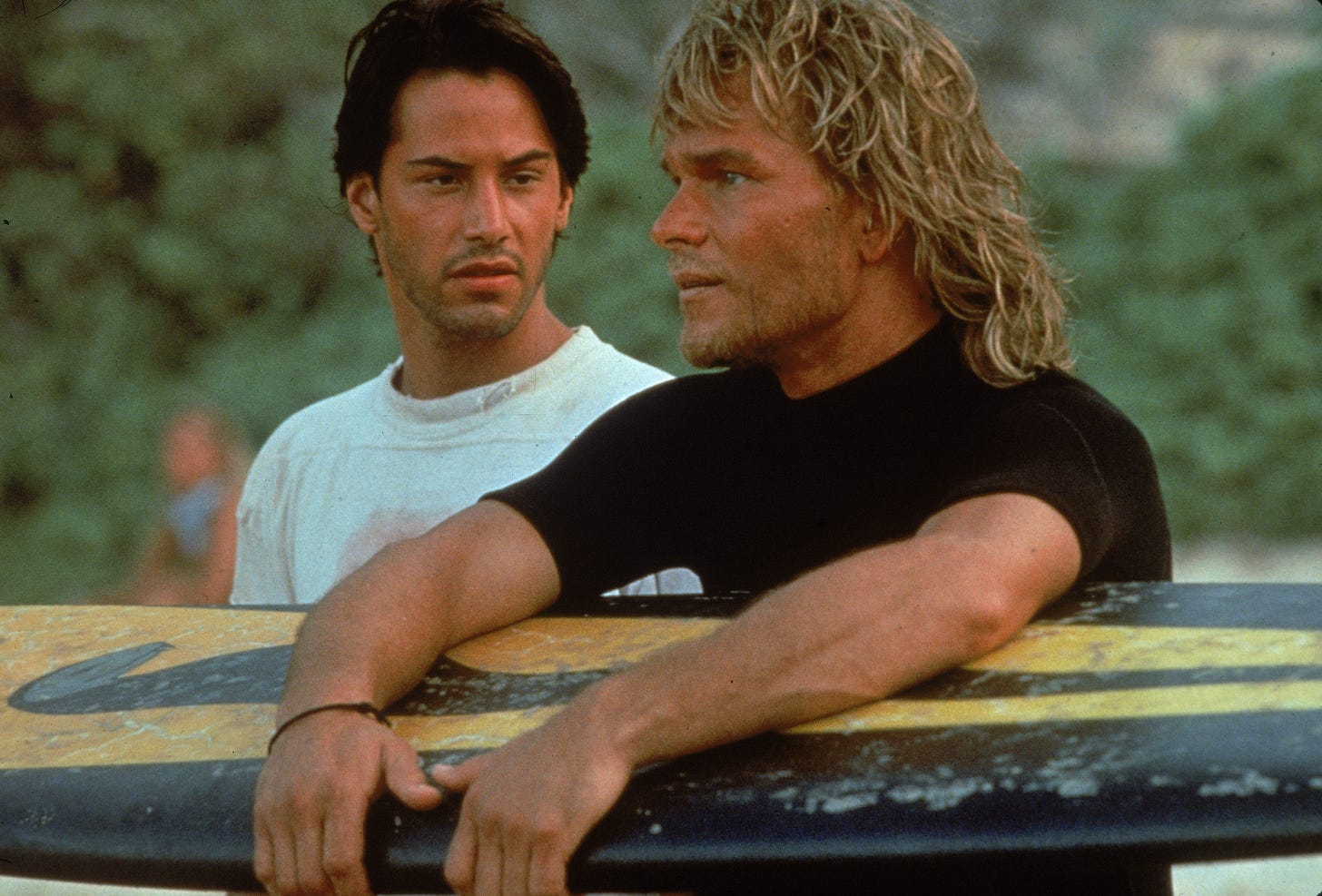Point Break
The ultimate
There are lots of reasons Point Break (1991) shouldn’t work. Keanu Reeves plays an FBI agent named Johnny Utah. Patrick Swayze plays Bodhi, the surfer-guru-bank-robber he’s tracking down. There’s a prolonged skydiving sequence, a Reagan mask crime spree, and a whole lot of extremely sincere talk about “finding the edge.” But in Kathryn Bigelow’s hands, it all holds together. You ride the wave out not because it makes sense, but because it feels like it does, and because of the elder statesman of American cinema: Keanu.
The film opens with a kind of parallel baptism: Utah doing FBI drills in the rain, Bodhi surfing waves at golden hour. Cuts between the two seem to suggest that this isn't really a story about law enforcement or crime, but about identity. Who you are when the gun goes off, who you are when the wave lifts you up. Bigelow frames the story as both a thriller and a spiritual quest, and she shoots the action with a visceral clarity that makes the air feel thinner and the water heavier. Everything moves. Everything matters.
On its surface, the film is about Johnny Utah going undercover to infiltrate a group of surfers who may also be the notorious “Ex-Presidents,” a gang of bank robbers who wear masks of Nixon, LBJ, Carter, and Reagan. (Adept social commentary given the year this came out.) But the deeper tension isn’t between Johnny and Bodhi; it’s within Johnny himself, a by-the-book jock who finds himself drawn to the counterculture he's meant to dismantle. This is a cop movie that doesn’t glorify the badge; It’s about seduction: of freedom, of adrenaline, of belonging. And it’s about how easy it is to lose yourself when someone offers you a life more vivid than the one you feel like you have or the one you had planned.
Reeves plays Johnny with his trademark brooding naiveté; he’s not dumb, just out of his element. And the late great Patrick Swayze is magnetic. Bodhi should be ridiculous. He quotes the Bhagavad Gita, calls surfing “a source,” believes in a kind of wave-based enlightenment, and it works. Swayze plays him with total conviction. He truly believes that the human spirit is meant to soar. And you kind of want him to be right.
Point Break came out at a time when action films were largely meathead affairs, all explosions and wisecracks. Bigelow brought something else: physicality, yes, but also lyricism. She’s interested in bodies in motion, and in the line between control and surrender. You see it in the surfing, in the skydiving, in the chases, the moments that feel less like spectacle and more like ritual. It’s easy to forget, amid all the adrenaline, how good this film looks.
Also great: It helped lay the groundwork for a whole subgenre of thrillers with homoerotic undertones. (You could argue it was carrying forward the legacy of Top Gun (1986)) The bond between Johnny and Bodhi is physical, intimate, and steeped in unspoken longing. They chase each other across landscapes and ideologies. They jump out of planes together. They fall in a way that feels mutual. It's not subtle. But it's also not a joke. The emotional core of the film is real: these are two men who see in each other the path not taken.
There’s a reason Point Break keeps coming back: quoted, parodied, remade (poorly) in 2015. Like The Fast and the Furious (which owes it a massive debt), it's a film about loyalty and speed and the thrill of going too far. But unlike many of its imitators, it never feels cynical. It believes in the myth it's selling. Watching it now, you can see the outlines of Bigelow’s later films: the tension, the choreography, the focus on people pushed to their limits. But here, it’s all still coated in salt spray and California sun, soaked in testosterone and transcendence. At one point, Bodhi says, “If you want the ultimate, you’ve got to be willing to pay the ultimate price.” The film believes that. The final scene of the film is a rare one: it will stay with you. Everything you think you knew about the film changes in an instant.
Point Break
Written by W. Peter Iliff; Directed by Kathryn Bigelow
1991
122 minutes
English
Recommended way to watch (at time of publication): Streaming on Max
You’ll like this if you like: The Fast and the Furious (2001), Top Gun (1986), The Hurt Locker (2008)

